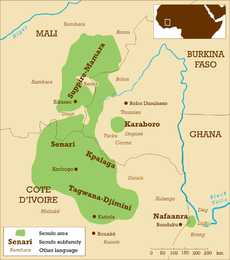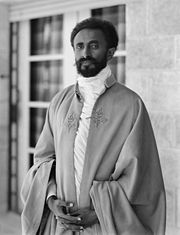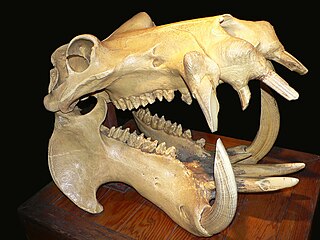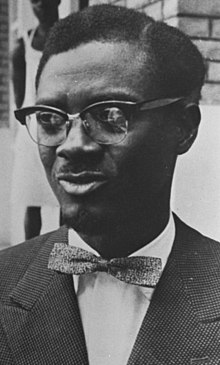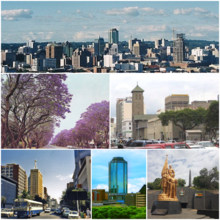
Back Portal:Afrika ALS بوابة:إفريقيا Arabic ܬܪܥܐ:ܐܦܪܝܩܐ ARC Portal:Afrika Azerbaijani Партал:Афрыка BE-X-OLD Портал:Африка Bulgarian دەروازە:ئەفریقا CKB Portál:Afrika Czech Portal:Afrika German Portal:Afrika DIQ



Africa is the world's second-largest and second-most populous continent after Asia. At about 30.3 million km2 (11.7 million square miles) including adjacent islands, it covers 20% of Earth's land area and 6% of its total surface area. With 1.4 billion people0 as of 2021, it accounts for about 18% of the world's human population. Africa's population is the youngest amongst all the continents; the median age in 2012 was 19.7, when the worldwide median age was 30.4. Despite a wide range of natural resources, Africa is the least wealthy continent per capita and second-least wealthy by total wealth, ahead of Oceania. Scholars have attributed this to different factors including geography, climate, corruption, colonialism, the Cold War, and neocolonialism. Despite this low concentration of wealth, recent economic expansion and the large and young population make Africa an important economic market in the broader global context. Africa has a large quantity of natural resources and food resources, including diamonds, sugar, salt, gold, iron, cobalt, uranium, copper, bauxite, silver, petroleum, natural gas and cocoa beans, and tropical fruit.
Africa straddles the equator and the prime meridian. It is the only continent to stretch from the northern temperate to the southern temperate zones. The majority of the continent and its countries are in the Northern Hemisphere, with a substantial portion and a number of countries in the Southern Hemisphere. Most of the continent lies in the tropics, except for a large part of Western Sahara, Algeria, Libya and Egypt, the northern tip of Mauritania, and the entire territories of Morocco, Ceuta, Melilla, and Tunisia which in turn are located above the tropic of Cancer, in the northern temperate zone. In the other extreme of the continent, southern Namibia, southern Botswana, great parts of South Africa, the entire territories of Lesotho and Eswatini and the southern tips of Mozambique and Madagascar are located below the tropic of Capricorn, in the southern temperate zone.
Africa is highly biodiverse; it is the continent with the largest number of megafauna species, as it was least affected by the extinction of the Pleistocene megafauna. However, Africa also is heavily affected by a wide range of environmental issues, including desertification, deforestation, water scarcity, and pollution. These entrenched environmental concerns are expected to worsen as climate change impacts Africa. The UN Intergovernmental Panel on Climate Change has identified Africa as the continent most vulnerable to climate change.
The history of Africa is long, complex, and varied, and has often been under-appreciated by the global historical community. Africa, particularly Eastern Africa, is widely accepted to be the place of origin of humans and the Hominidae clade, also known as the great apes. The earliest hominids and their ancestors have been dated to around 7 million years ago, including Sahelanthropus, Australopithecus africanus, A. afarensis, Homo erectus, H. habilis and H. ergaster, the earliest Homo sapiens (modern human) remains, found in Ethiopia, South Africa, and Morocco, date to circa 233,000, 259,000, and 300,000 years ago, respectively, and Homo sapiens is believed to have originated in Africa around 350,000–260,000 years ago. Africa is also considered by anthropologists to be the most genetically diverse continent as a result of being the longest inhabited. (Full article...)
Selected article –
The Chilembwe uprising was a rebellion against British colonial rule in Nyasaland (modern-day Malawi) which took place in January 1915. It was led by John Chilembwe, an American-educated Baptist minister. Based around his church in the village of Mbombwe in the south-east of the colony, the leaders of the revolt were mainly from an emerging black middle class. They were motivated by grievances against the British colonial system, which included forced labour, racial discrimination and new demands imposed on the African population following the outbreak of World War I.
The revolt broke out in the evening of 23 January 1915 when rebels, incited by Chilembwe, attacked the headquarters of the A. L. Bruce Estates at Magomero and killed three white settlers. A largely unsuccessful attack on a weapons store in Blantyre followed during the night. By the morning of 24 January, the colonial authorities had mobilised the Nyasaland Volunteer Reserve (NVR) and called in regular troops from the King's African Rifles (KAR). After a failed attack by KAR troops on Mbombwe on 25 January, the rebels attacked a Christian mission at Nguludi and burned it down. The KAR and NVR captured Mbombwe without encountering any resistance on 26 January. Many of the rebels, including Chilembwe himself, fled towards Portuguese Mozambique, hoping to reach safety there, but many were captured. About 40 rebels were executed in the revolt's aftermath, and 300 were imprisoned; Chilembwe was shot dead by a police patrol near the border on 3 February. (Full article...)Featured pictures –
Did you know (auto-generated) -

- ... that in the 1880s Joseph T. Wilson wrote the "most comprehensive study of African American military service" of the era?
- ... that enrollment at a school for African-American students in Virginia grew from 14 pupils to 1,300 in its first ten years?
- ... that Jane C. Beck traveled to Virginia, West Africa, and England to research the family history of Daisy Turner for her 2015 book Daisy Turner's Kin: An African American Family Saga?
- ... that in 2019 the South African army's Natal Carbineers were renamed the Ingobamakhosi Carbineers, after a Zulu regiment that had fought against them at the 1879 Battle of Isandlwana?
- ... that Bill Pinkney was the first African American to sail around the world solo via the Cape of Good Hope and Cape Horn?
- ... that Mackay Davashe wrote "Lakutshona Ilanga", the English version of which, sung by Miriam Makeba, became the first South African piece to chart on the Billboard Hot 100?
Categories
Selected biography –
Patrice Émery Lumumba (/lʊˈmʊmbə/ ; 2 July 1925 – 17 January 1961), born Isaïe Tasumbu Tawosa, was a Congolese politician and independence leader who served as the first prime minister of the Democratic Republic of the Congo (then known as the Republic of the Congo) from June until September 1960, following the May 1960 election. He was the leader of the Congolese National Movement (MNC) from 1958 until his execution in January 1961. Ideologically an African nationalist and pan-Africanist, he played a significant role in the transformation of the Congo from a colony of Belgium into an independent republic.
Shortly after Congolese independence in June 1960, a mutiny broke out in the army, marking the beginning of the Congo Crisis. After a coup, Lumumba attempted to escape to Stanleyville to join his supporters who had established a new anti-Mobutu state called the Free Republic of the Congo. Lumumba was captured en route by state authorities under Joseph-Désiré Mobutu, sent to the State of Katanga and, with the help of Belgian partisans, executed by the separatist Katangan authorities of Moïse Tshombe. He was seen as a martyr for the pan-African movement. In 2002, Belgium formally apologised for its role in the execution. (Full article...)Selected country –
 |
 |
||

| |||
Chad (Arabic: تشاد; French: Tchad), officially the Republic of Chad, is a landlocked country in central Africa. It borders Libya to the north, Sudan to the east, the Central African Republic to the south, Cameroon and Nigeria to the southwest, and Niger to the west.
Chad has three major geographical regions: a desert zone in the north, an arid Sahelian belt in the centre and a more fertile Sudanian savanna zone in the south. Lake Chad, after which the country is named, is the largest wetland in Chad and the second largest in Africa. Chad's highest peak is the Emi Koussi in the Sahara, and the largest city is N'Djamena, the capital. Chad is home to over 200 different ethnic and linguistic groups.
While many political parties are active, power lies firmly in the hands of President Idriss Déby and his Patriotic Salvation Movement. Chad remains plagued by political violence and recurrent attempted coups d'état. Recently, the Darfur conflict in Sudan has spilt over the border and destabilised the nation. (Read more...)
Selected city –
Harare (/həˈrɑːreɪ/ hə-RAR-ay), formerly known as Salisbury (/ˈsɔːlzbəri/ SAWLZ-bər-ee), is the capital and largest city of Zimbabwe. The city proper has an area of 982.3 km2 (379.3 sq mi), a population of 1,849,600 as of the 2022 census and an estimated 2,487,209 people in its metropolitan province. The city is situated in north-eastern Zimbabwe in the country's Mashonaland region. Harare is a metropolitan province which also incorporates the municipalities of Chitungwiza and Epworth. The city sits on a plateau at an elevation of 1,483 metres (4,865 feet) above sea level, and its climate falls into the subtropical highland category.
The city was founded in 1890 by the Pioneer Column, a small military force of the British South Africa Company, and was named Fort Salisbury after the British Prime Minister Lord Salisbury. Company administrators demarcated the city and ran it until Southern Rhodesia achieved responsible government in 1923. Salisbury was thereafter the seat of the Southern Rhodesian (later Rhodesian) government and, between 1953 and 1963, the capital of the Central African Federation. It retained the name Salisbury until 1982 when it was renamed Harare on the second anniversary of Zimbabwe's independence from the United Kingdom. The national parliament moved out of Harare upon completion of the New Parliament of Zimbabwe in Mount Hampden in April 2022. (Full article...)In the news
- 12 February 2024 –
- Two boats collide on the Congo River near Kinshasa, Democratic Republic of the Congo; with the death toll remains unclear. (AP)
- 11 February 2024 – 2023 Africa Cup of Nations
- In association football, hosts Ivory Coast win their third Africa Cup of Nations by defeating Nigeria 2–1 in the final. Sébastien Haller scores the winning goal in the 81st minute. (The Guardian)
- 10 February 2024 – Somali civil war
- Four Emirati soldiers and a Bahraini military officer are killed, while ten other people are injured, when a soldier opens fire at a military base in Mogadishu, Somalia, before being killed in the ensuing shootout. Al-Shabaab claims responsibility. (AP)
- 10 February 2024 –
- A Eurocopter EC130 helicopter crashes near Nipton, California, United States, killing all the six people on board, including Nigerian banker Herbert Wigwe. (CBS News)
- 10 February 2024 – 2023–2024 Senegalese protests
- Violent protests occur in Senegal following an announcement by President Macky Sall that presidential elections have been delayed from February 25 to December 15. (Sky News)
- 9 February 2024 –
- At least 18 people are killed during a collision between a bus and a truck on a road in Kinshasa, Democratic Republic of the Congo. (AP)
Updated: 16:33, 14 February 2024
General images -
Africa topics
More did you know –
- ... that Liberia College in the country of Liberia was authorized by the legislature in 1851, but did not start classes until 1863?
- ... that the forced removal of 700,000 people from slums in Zimbabwe in 2005 was called "a crime against humanity" by the UN?
- ... that the supreme god of the southern African Bushmen is Cagn, a trickster who shapeshifts into a praying mantis?
- ... that Bahá'í Faith in Niger began during a period of wide scale growth in the religion across Sub-Saharan Africa near the end of its colonial period?
Related portals
Major Religions in Africa
North Africa
West Africa
Central Africa
East Africa
Southern Africa
Associated Wikimedia
The following Wikimedia Foundation sister projects provide more on this subject:
-
Commons
Free media repository -
Wikibooks
Free textbooks and manuals -
Wikidata
Free knowledge base -
Wikinews
Free-content news -
Wikiquote
Collection of quotations -
Wikisource
Free-content library -
Wikispecies
Directory of species -
Wikiversity
Free learning tools -
Wikivoyage
Free travel guide -
Wiktionary
Dictionary and thesaurus
More portals
© MMXXIII Rich X Search. We shall prevail. All rights reserved. Rich X Search






